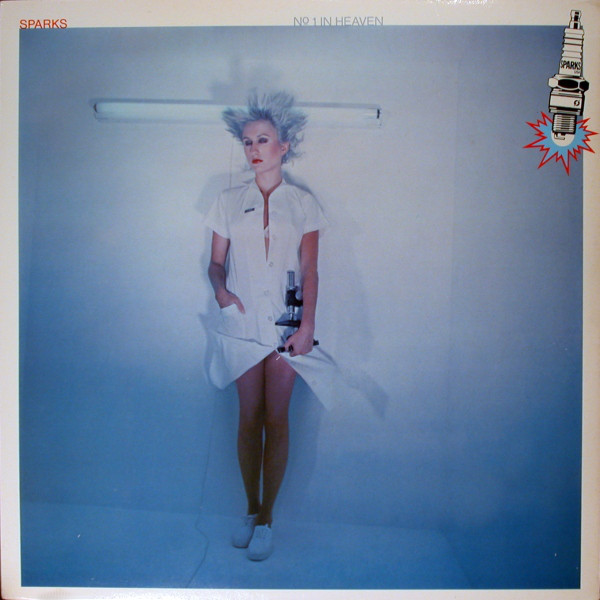Career reinventions don’t come much more well executed than Sparks’ recently reissued 1979 album, No.1 in Heaven. While brothers Ronald and Russell Mael had found an enthusiastic audience for their arch intelligent pop in the UK in the mid 70s, reaching a commercial peak with the game-changing single ”This Town Ain’t Big Enough for the Both of Us”, and the evergreen Kimono My House album, the fact that they required more thought processe to be used than your average pop band saw the inevitable diminishing returns in regards to their sales. Over the next few years Ron and Russell would ditch the rest of the band in favour of session musicians, as well as return home to the USA, all while seemingly becoming a little bit lost and confused in regards to a creative direction.
Salvation would be born out of inspiration, as the Mael brothers heard Donna Summer’s monster electronica-heavy hit single “I Feel Love”, and reached out to producer Giorgio Moroder with a view to recording new material with him. To his eternal credit, rather than dismiss Sparks as a washed up act desperately scrabbling for anything that would help them cling to relevancy, Moroder invited Ron and Russell into the Musicland studio with him , and the result was No.1 in Heaven, an album which not only helped reconfirm Sparks as a force in popular song, but saw them pretty much alter the concept of what a band was and could be.
Prior to No. 1 in Heaven, bands were generally four or more individuals, although there were more stripped down bare-bones power trios doing the rounds as well. It was almost never less than three though, as even duos had backing bands, a la The Carpenters. Unless you were Suicide. Or The Silver Apples. It was Sparks that popularised the duo as band format. Suddenly a band could be just a vocalist and a keyboard player, and the template for the synth-pop duos that would become so popular over the next decade was formed. Be they Soft Cell, Yazoo, The Communards, or even the mighty Pet Shop Boys, they all owe Sparks a tip of the hat for pretty single handedly creating the line up format of their bands. Not only that, but with Moroder’s help Sparks reinvented synth-pop from the over-serious detached self-importance of the likes of Kraftwerk, Tubeway Army, and Jean-Micheal Jarre, to something considerably more personable and playful. No.1 in Heaven is an album which has a joyous feeling running all the way through it, something which is particularly difficult to achieve when using the cold and unyielding sounds of the synthesiser, but something which Sparks never had a problem with, especially with the help of the production smarts of Moroder.
Clocking in at under an economical 35 minutes, No.1 in Heaven is heaving with hit single potential, which given Moroder’s involvement is no surprise. Four of No.1 in Heaven’s six tracks were released as singles, with “No.1 Song in Heaven” seeing Sparks crack the top 20 for the first time in years, and the irresistible “Beat the Clock” going one better and hitting the top 10. Another single, album opener “Tryouts for the Human Race”, deserved to be a bigger hit, but given that the album had been out a few months by then, most music fans with an enthusiasm for the new Sparks sound would probably already have it in their collection. With half a dozen tracks over the course of the whole album, Moroder and Sparks made sure there was more than enough room for the cutting edge electronica soundscape to make an impression. “No.1 Song in Heaven” sounds particularly thrilling in its album format, giving the much loved single version an extended introduction which enhances rather than detracts from the hit version.
With the exception of “La Dolce Vita”, all the songs from No.1 in Heaven that were released as singles had alternative extended mixes or single versions, some of which are featured on the second disc of this recent reissue. These are accompanied by a couple of uniquely amusing promos for the album featuring comedian Peter Cook, who evidently had great fun throwing in pop culture references. Such are the effectiveness of these promos, you have to ask why such an approach wasn’t used more often. Another thing of note is that the original album and the bonus material are given two separate discs in CD format, despite all the material fitting neatly on a single CD. This maintains the original integrity of the album, without the listener having to stop the CD if they just wanted to hear No.1 in Heaven as originally intended. Perhaps if the reissue was not done via The Mael Brothers own Lil’ Beethoven imprint, such care might not have been taken, so it’s a nice touch.
40 years after its release, No.1 in Heaven continues to stand up to scrutiny as one of the key albums by Sparks. Sure, Giorgio Moroder’s involvement took the music on the album to another level, but credit should go to the Mael Brothers for knowing who they needed on production duties to reinvigorate their career. It was a hugely influential album at the time, and remains a life-affirming electropop classic that proved that, even outside of Disco, synthesiser music didn’t always have to equate to self-important and dour young men.














No Comment